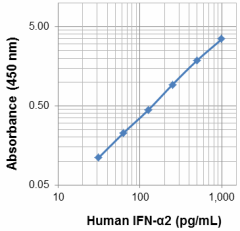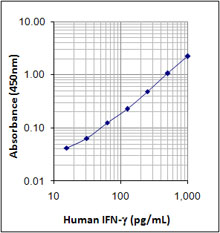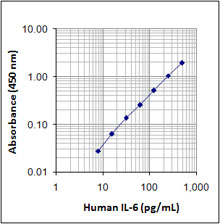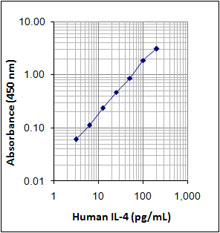- Regulatory Status
- RUO
- Other Names
- IFNα2, IFNa2, IFNalpha2, IFN alpha 2, Interferon Alpha 2, IFN alpha A, IFNa2a, IFNa2b, IFNa2c
- Ave. Rating
- Submit a Review
- Product Citations
- publications

| Cat # | Size | Price | Quantity Check Availability | Save | ||
|---|---|---|---|---|---|---|
| 446407 | 1 Pre-coated Plate | 463€ | ||||
Interferon alpha-2 (IFN-α2) is a cytokine encoded by the IFNA2 gene located on chromosome 9. It belongs to the Type 1 IFN family which includes 13 α subtypes, 1 β, and 1 ω. IFN-α2 was the first of these subtypes to be produced pharmaceutically and is the most widely studied. The mature secreted protein consists of 165 amino acids with 5 α-helices and two disulfide bonds. There are a several allelic variants of IFN-α2, including IFN-α2a, IFN-α2b, and IFN-α2c. IFN-α2 can act on all cell types due to the ubiquitous expression of the Type 1 IFN receptor (IFNAR).
IFN-α2 acts to combat infection by stimulating the production of proteins that inhibit viral replication and prevent viral entry into neighboring cells. IFN-α2 can stimulate the immune system by initiating T and NK cell mediated cytotoxicity. IFN-α2 also can inhibit cancer cell proliferation and activate immune system to target cancer cells. IFN-α2 has been used therapeutically in a variety of viral infections (including hepatitis B and C) and certain cancers (such as melanoma, renal cell carcinoma).
BioLegend's LEGEND MAX™ Human IFN-α2 ELISA kit is a Sandwich Enzyme-Linked Immunosorbent Assay (ELISA) with a 96-well strip plate that is pre-coated with a monoclonal mouse anti-human IFN-α2 capture antibody. The detection antibody is a biotinylated monoclonal mouse anti-human IFN-α2 antibody. This kit is specifically designed for the accurate quantitation of human IFN-α2 from cell culture supernatant, serum, plasma and other biological fluids. Different IFN-α2 allelic variants can be detected equally. It is analytically validated with ready-to-use reagents.
Kit Contents
- Kit Contents
-
- Anti-Human IFN-α2 Pre-coated 96-well Strip Microplate
- Human IFN-α2 Dectection Antibody
- Human IFN-α2 Standard
- Matrix A
- Avidin-HRP
- Assay Buffer G
- Wash Buffer (20X)
- Substrate Solution F
- Stop Solution
- Plate Sealers
Product Details
- Verified Reactivity
- Human
- Application
-
ELISA
- Sensitivity
- The minimum detectable concentration of IFN-α2 is 2.94±0.89 pg/mL with assay buffer (n=9), and 2.57±0.64 pg/mL with Matrix A (n=10). The sensitivities shown are ± one standard deviation.
- Standard Range
- 15.6 - 1000 pg/mL
- Materials Not Included
-
- Microplate reader able to measure absorbance at 450 nm
- Adjustable pipettes to measure volumes ranging from 1 µL to 1,000 µL
- Deionized water
- Wash bottle or automated microplate washer
- Log-Log graph paper or software for data analysis
- Polypropylene tubes to prepare standard dilutions
- Timer
- Plate Shaker
- Polypropylene vials
Antigen Details
- Biology Area
- Immunology, Innate Immunity
- Molecular Family
- Cytokines/Chemokines
- Gene ID
- 3440 View all products for this Gene ID
- UniProt
- View information about IFN-alpha2 on UniProt.org
Related Pages & Pathways
Pages
Related FAQs
- In your LEGEND MAX™ ELISA Kits, there is a step that calls for washing the plates before adding sample. What is the purpose of this step?
-
We typically use a stabilizer for pre-coated plates. The additional washing step is designed to remove these components before you start the assay. If you do not perform the washing, the effect on assay performance is negligible.
- I have multiple LEGEND MAX™ ELISA kits that I want to run simultaneously. Can I use the same wash buffer for all the kits?
-
The wash buffer provided in all our LEGEND MAX™ kits is the same and the part numbers on the wash buffer bottles in these kits should be identical. For ELISA MAX™ Deluxe and ELISA MAX™ Standard Sets, we provide a recipe for the wash buffer on each kit’s technical data sheet. This recipe is the same for all ELISA MAX™ sets.
- For some of your ELISA kits, why do my serum samples require dilution with assay buffer?
-
In some cases, dilution with assay buffer is required to minimize the matrix difference between the samples and the standards to achieve better accuracy.
 Login / Register
Login / Register 













Follow Us